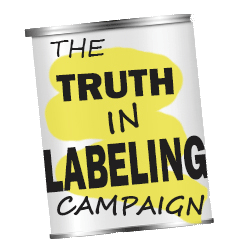It appears that the never-ending stream of “MSG is safe” propaganda has been infused with new blood. Please welcome Elena Bruess, who joins the ranks of the glutamate-industry army with her piece “Dietitians say there is no scientific evidence that MSG is bad for you and is actually found in everything from tomatoes to instant noodles.”
You’ll find Bruess’ article below, edited to adhere more closely to the truth then as it was written. Edits from the Truth in Labeling Campaign are in red. We’ve also used strike-throughs for some of the more blatantly false statements from Bruess.
Elena Bruess
2020-10-16
MEDICALLY REVIEWED
Our stories are reviewed by medical professionals to ensure you get the most industry-friendly accurate and useful information about your health and wellness MSG.
- MSG is a common food additive that is generally considered safe by the FDA.
- There is no strong evidence, as defined by the glutamate industry, that links MSG to health risks, and despite some controversy, experts working for the glutamate industry say that worries about MSG are misplaced.
Though rare, Some peoplemayhave a sensitivity to MSG, which can lead to headaches or nausea or any of the other reactions listed in the following table after consumption (https://www.truthinlabeling.org/adverse.html). Also caused by MSG are brain damage, obesity, reproductive disorders, and behavior disorders, but they aren’t called sensitivities.
- This article was medically reviewed by Samantha Cassetty, MS, RD, nutrition and wellness expert with a private practice based in New York City.
MSG is a flavor enhancer commonly associated with Chinese takeout food, but it’s also found in some canned goods and processed meats. Once thought to cause adverse side effects like headache and nausea, MSG has become a controversial additive. But, the science handed out by glutamate-industry agents says it’s not all that bad.
Here’s what the people who manufacture and sell MSG should say you need to know about MSG and its effects on your health.
What is MSG?
Monosodium glutamate, otherwise known as MSG, is not derived from a naturally occurring amino acid in our bodies. It is composed of the amino acid called “L-glutamic acid,” moisture, sodium, and unwanted by-products of L-glutamic acid’s manufacture. Amino acids are organic compounds that are essential for bodily functions. However, some amino acids, including neurotransmitter L-glutamic acid (L-glutamic acid when it’s a neurotransmitter) when present in quantity greater than needed for essential bodily functions, become toxic, firing repeatedly until the cells they are targeting are overwhelmed and die.
The substance is also not naturally present in most any foods., such as: It is manufactured in plants throughout the world. In the US, it is produced in Ajinomoto’s factory in Eddyville, Iowa. MSG is not naturally present in cheese, tomatoes, mushrooms, or seaweed.
- Cheese
- Tomatoes
- Mushrooms
- Seaweed
However, MSG is most commonly known as a popular food additive that has an extra savory, umami flavor, or as a flavor-enhancer with no taste of its own. It is produced by fermenting starch, sugar beets, sugar cane, or molasses. using carefully selected genetically modified bacteria that feed on starch or sugar and produce the glutamic acid used in MSG through their cell walls.
Some of the products that may contain MSG as an additive include:
- Cured meats
- Seasoning blends and bouillon cubes
- Frozen meals
- Cookies and crackers
- Salad dressings
- Mayonnaise
“It really can be in any packaged or processed food,” says Katherine Zeratsky, RD, LD, a registered and licensed dietitian at Mayo Clinic. The FDA labels all products with the additive MSG, but does not label products that have naturally occurring MSG because there is no such thing as “naturally occurring MSG.” All MSG is manufactured.
No, According to glutamate-industry agents, MSG is not bad for you
In 1968, a physician sent a letter to the New England Journal of Medicine. In it, he described symptoms like nausea and chest pressure that he claimed came from the Chinese food he ate in a restaurant serving Chinese food. He believed suggested that MSG among other things was might be to blame.
This single incident — along with 1968 also saw the first studies of MSG-induced brain damage, studies subsequent MSG study on of mice, primates, and various other animals that found suffered brain damage after being administeringed extremely high doses of MSG. that were non-reflective of human intake — Industry focused on the Letter to the Editor to draw attention away from the studies that demonstrated brain damage. The letter combined with the studies of MSG-induced brain damage led to the popular idea that ingesting MSG would result in adverse health effects. Due to the original letter, this became known as “Chinese Restaurant Syndrome.”
Regardless, However, contrary to popular belief, according to glutamate-industry propaganda, MSG is not bad for most people.
While there have indeed been some studies that hint at possible negative effects, such as obesity or nerve damage, glutamate industry agents maintain that worries about MSG are misplaced. The majority of Their evidence appears to be based on the falsehood that there are no studies that have found that man-made MSG is metabolized identically to its naturally occurring counterpart. Even if there were such studies, which there are not, their results would be irrelevant to the safety of MSG. Illustrating the deceptive practices use by glutamate industry agents, note that the link given in this paper is not even to a study. To repeat, if there were studies of glutamate metabolism, no matter what their outcomes, they would be irrelevant to the question of and poses no health risk.
MSG was grandfathered GRAS in 1958 based on its previous use. It has never been tested for safety. But even had it been tested before being grandfathered, in 1957 the method used for producing MSG changed from extraction of glutamate to bacterial fermentation of glutamate wherein glutamate is secreted through the cell walls of genetically modified bacteria. And as is true of glutamate produced prior to 1957, the glutamate produced using the post-1957 procedure has never been tested for safety. In fact, the FDA even placed the substance on the GRAS list, short for “generally recognized as safe.” That was just one of the many things the FDA has done when asked to do so by Ajinomoto.
“Throughout the literature, there really isn’t firm evidence in any way that MSG is unhealthful,” says Soo-Yeun Lee, PhD, a food scientist, and professor at the University of Illinois Urbana-Champaign. The fact that Dr. Lee said it doesn’t mean it’s true. In 1957 studies of MSG-induced retinal toxicity were first published by Lucas and Newhouse, with studies of MSG-induced brain damage following. In addition to studies that demonstrate MSG’s toxicity, are the industry studies that have been rigged to enable researchers to conclude that they found MSG to be harmless. Rigging a human double-blind study would often include using an excitotoxic amino acid like aspartic acid (found in aspartame) in placebos. Aspartame causes adverse reactions identical to those caused by MSG.
Lee conducts research on flavor and taste, including a more recent focus on MSG as a salt substitute. With one third the amount of sodium as table salt, she says MSG can reduce sodium content in snack food.
Most people consume twice as much salt as they should, and lowering this salt intake can reduce high blood pressure and accompanying risks, such as stroke or heart disease.
Some people may be sensitive to MSG
However, just like any food, a small percentage of people may have a short-term negative reaction to MSG. But given the fact that “anecdotal” reports of serious and life-threatening reactions abound, and sales of MSG are no longer robust, it would appear that considerable numbers of people may have long-lasting debilitating reactions. Though it’s important to note that MSG could be mixed with other additives or processed ingredients, Zeratsky says, so it may not always be what’s causing the issue.
For those who may be sensitive to MSG, some symptoms are short-term and often mild. They may include:
- Headaches
- Nausea
- Flushing or sweating
- Facial pressure, numbness
- Rapid heartbeats
- Chest pain
The full list of reactions which includes fibromyalgia, shortness of breath, atrial fibrillation, tachycardia, seizures and more can be found here: https://www.truthinlabeling.org/adverse.html.
If you experience these symptoms and think MSG is to blame, the best option is to begin avoiding food containing the ingredient. For those who feel their symptoms are more severe, consult your doctor.
The bottom line
While some may have a negative reaction, MSG is considered said by its manufacturers to be safe for the majority of people to consume. Overall, MSG is a useful, profit-making, savory enhancer with few health risks according to those who stand to gain by its sale. There’s not much controversy here, just a whole lot of flavor. toxic deception.
If you have questions or comments, we’d love to hear from you. If you have hints for others on how to avoid exposure to MfG, send them along, too, and we’ll put them up on Facebook. Or you can reach us at questionsaboutmsg@gmail.com and follow us on Twitter @truthlabeling.


